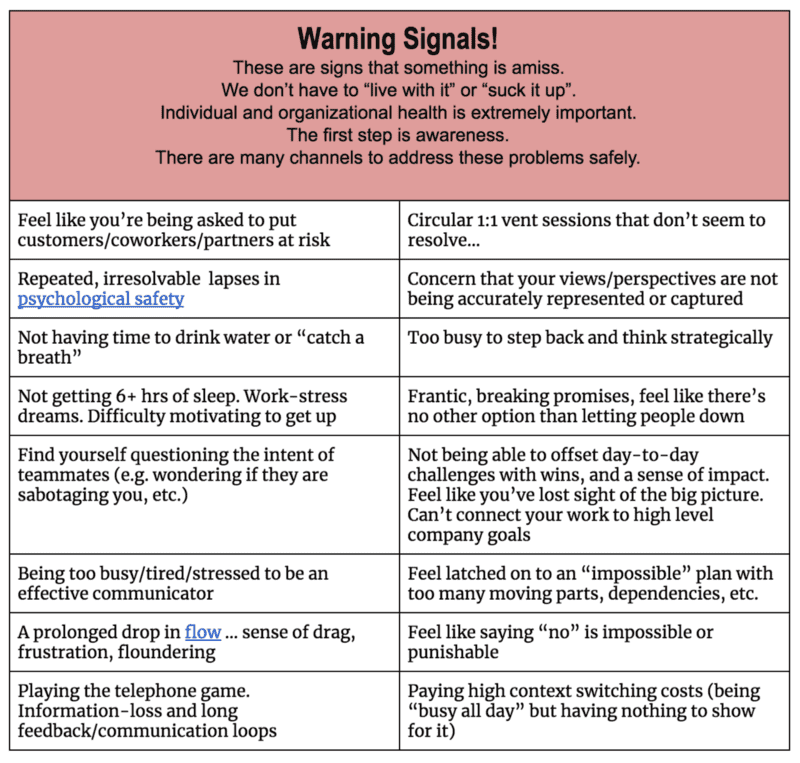I recently had an interesting conversation about maintaining the health of an organization during periods of rapid growth. You’ll experience no shortage of acute stressors, but a resilient culture should ward off any chronic issues.
One key conclusion was that identifying cracks/strains in the system starts with an individual sense of what is most certainly not ok, coupled with explicit permission (duty, even) to “raise the flag” or “pull the Andon cord”. Self-care and awareness are vital. If you’re waiting for managers to “see the signs”, you’re going to wait too long (or wait forever if they have a vested interest in preserving the appearance of health).
The worst thing that can happen if symptoms go unaddressed is that unhealthy patterns become normalized/institutionalized, and sometimes even glorified. Leaders often do this inadvertently. They’ll preach sustainability, but in their own personal work will habitually push beyond the healthy limit. These behaviors are then seen as “the norm”. Not good.
Below I have a quick sample list of “warning signs” (or signals). I’d encourage you to write a couple with your team. It’s what you do with this list that really matters. The key idea is that you empower team members to recognize the early warning signs, and then create a safe setting to raise these issues. I find that by being explicit here — by explicitly stating that it’s NOT ok to feel these things for any prolonged period of time — that you can create that safety. Pro Tip: it can make a huge difference if a leader talks frankly about times when they’ve slipped into these patterns.
- Feel like you’re being asked to put customers/coworkers/partners at risk
- Repeated, irresolvable lapses in psychological safety
- Not having time to drink water or “catch a breath”
- Not getting 6+ hrs of sleep. Work-stress dreams. Difficulty motivating to get up
- Find yourself questioning the intent of teammates (e.g. wondering if they are sabotaging you, etc.)
- Being too busy/tired/stressed to be an effective communicator
- A prolonged drop in flow … sense of drag, frustration, floundering
- Playing the telephone game. Information-loss and long feedback/communication loops
- Circular 1:1 vent sessions that don’t seem to resolve…
- Concern that your views/perspectives are not being accurately represented or captured
- Too busy to step back and think strategically
- Frantic, breaking promises, feel like there’s no other option than letting people down
- Not being able to offset day-to-day challenges with wins, and a sense of impact. Feel like you’ve lost sight of the big picture. Can’t connect your work to high level company goals
- Feel latched on to an “impossible” plan with too many moving parts, dependencies, etc.
- Feel like saying “no” is impossible or punishable
- Paying high context switching costs (being “busy all day” but having nothing to show for it)
